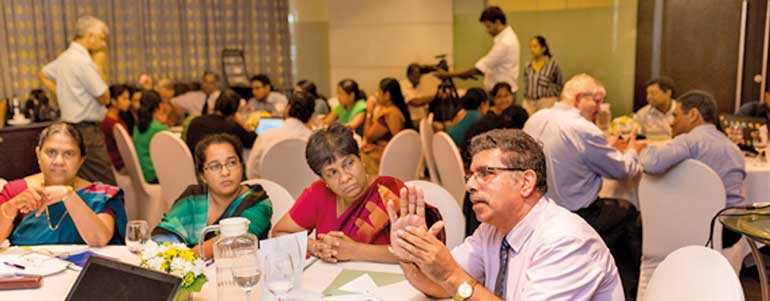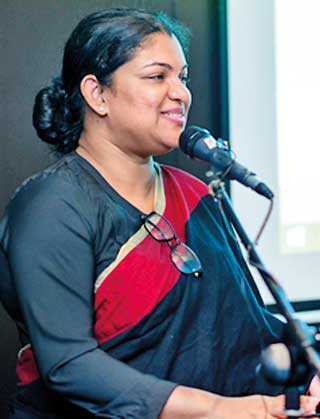Thursday Feb 26, 2026
Thursday Feb 26, 2026
Monday, 3 February 2020 00:46 - - {{hitsCtrl.values.hits}}

Participants at the workshop including representatives from the Livestock Development Board and Assistant Director at the Climate Change Secretariat
SLYCAN Trust in collaboration with Humane Society International recently conducted a workshop on synergies between sustainable production and consumption (SCP), Sustainable Development Goals (SDGs), and climate action in the livestock sector of Sri Lanka.
The workshop was held at Cinnamon Grand with the participation of local Government authorities, relevant ministries and departments, NGOs, academia, and other stakeholders working in the livestock sector. It was part of the ongoing research to analyse Sri Lanka’s livestock sector policies and plans and identify potential synergies with climate change commitments, SDGs, and activities related to SCP.
 |
|
SLYCAN Trust Executive Director and Humane Society International Country Director Vositha Wijenayake
|
The livestock sector is included in Sri Lanka’s national commitments under the Paris Agreement, with a focus on adapting the sector to the adverse impacts of climate change. Among the United Nations Agenda 2030 with its 17 SDGs, SDG 12 on sustainable consumption and production plays a key role in regard to economic sectors and development in a sustainable and ethical manner.
The livestock sector is impacted by different climate impacts which result in creating losses and damages to the sector. Increase of temperature, floods and droughts have adverse impacts on the communities focusing on the sector, and the farm animals.
“Sri Lanka has committed to take action to address the impacts of climate change as part of the Nationally Determined Contributions (NDC) of Sri Lanka. Livestock sector falls under the adaptation category of these NDCs, and links with those on food security.
“Given that Sri Lanka is presently reviewing the NDCs, it would be a good opportunity to focus on enhancing climate action in the livestock sector, synergised with SDG related actions, and ethical and sustainable production and consumption,” said SLYCAN Trust Executive Director and Humane Society International Country Director Vositha Wijenayake.
“The SDGs are a balance between social, economic, and environmental aspects. From the 1970s on, importance was given to ‘sustainable development,’ and it was never looked at as a single subject. It is not one sector but a matter that cuts across all sectors, especially the five Ps: people, plants, peace, partnership, and prosperity,” explained Sri Lanka’s Sustainable Development Council Director General Dr. Sugath Yalegama.
Presenting an overview of the SDGs and their targets relevant to livestock, he went on to say: “The difference between economic and sustainable development is that the former is measured in GDP per capita whereas the latter is measured in terms of sustainability. Sustainable development in livestock is connected to three areas: environment, social conditions, and economy. The SDGs are a holistic approach and focus on inclusive development and stakeholder engagement.”
Speaking on the impact of intensive dairy farming on climate and environment, Ministry of Livestock Development and Rural Infrastructure National Food Promotion Board former Chairman Dr. Sam Daniel said: “The farm is a business, therefore profits are required: but we need to make it a sustainable system. There are societal needs of quality, safety and ethical means of food production ensuring the welfare of animals. “It is important that we are made aware of both the direct and indirect impacts of climate change in the dairy sector including animal performance, heat stress, diseases, and land accessibility due to floods as well as the more indirect impacts including the yield and quality of feed crops, changes in growing seasons, and water-logging.” The livestock sector has also been identified as a cause for deforestation in Sri Lanka. SLYCAN Trust Ecosystems and Conservation Programme Director and Forests of Sri Lanka former Conservator General Anura Sathurusinghe, also partaking at the event said: “It was identified during the activities of Sri Lanka’s UN-REDD programme that livestock is among the key contributors to deforestation. This highlights that livestock sector actions are not stand-alone, but linked to other sectors and resources as well.”
The workshop presented preliminary findings of the ongoing research, conducted by SLYCAN Trust and further explored synergies between the livestock sector, sustainable development, and climate change in a multi-stakeholder driven process, taking into account topics such as just transition, emission reduction, cleaner production, and human health. Besides the individuals mentioned above, the speakers present at the workshop included National Cleaner Production Centre CEO Samantha Kumarasena, University of Moratuwa Senior Lecturer Dr. Thusitha Sugathapala and SUSTENT Director Markus Moeller.
SLYCAN Trust works to contribute to the collective local and global efforts to address the impacts of climate change, animal welfare, as well as social and economic issues hindering social justice. The organisation achieves these objectives through policy advocacy, action campaigns, ground-level action, outreach and networking with like-minded organisations, awareness creation, and capacity building.